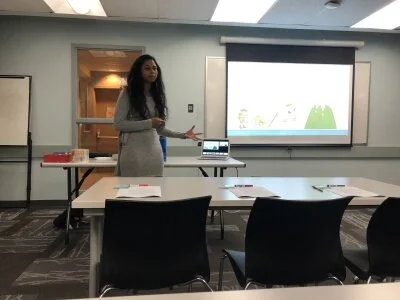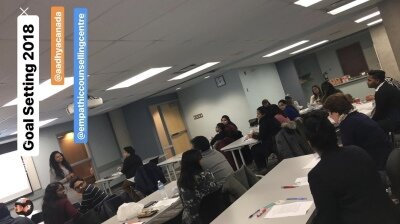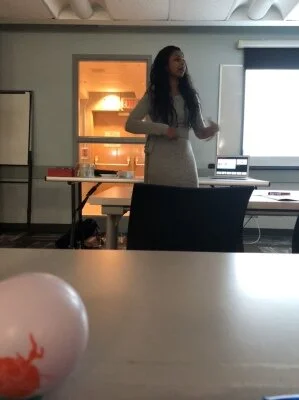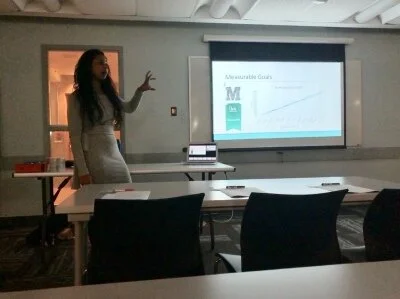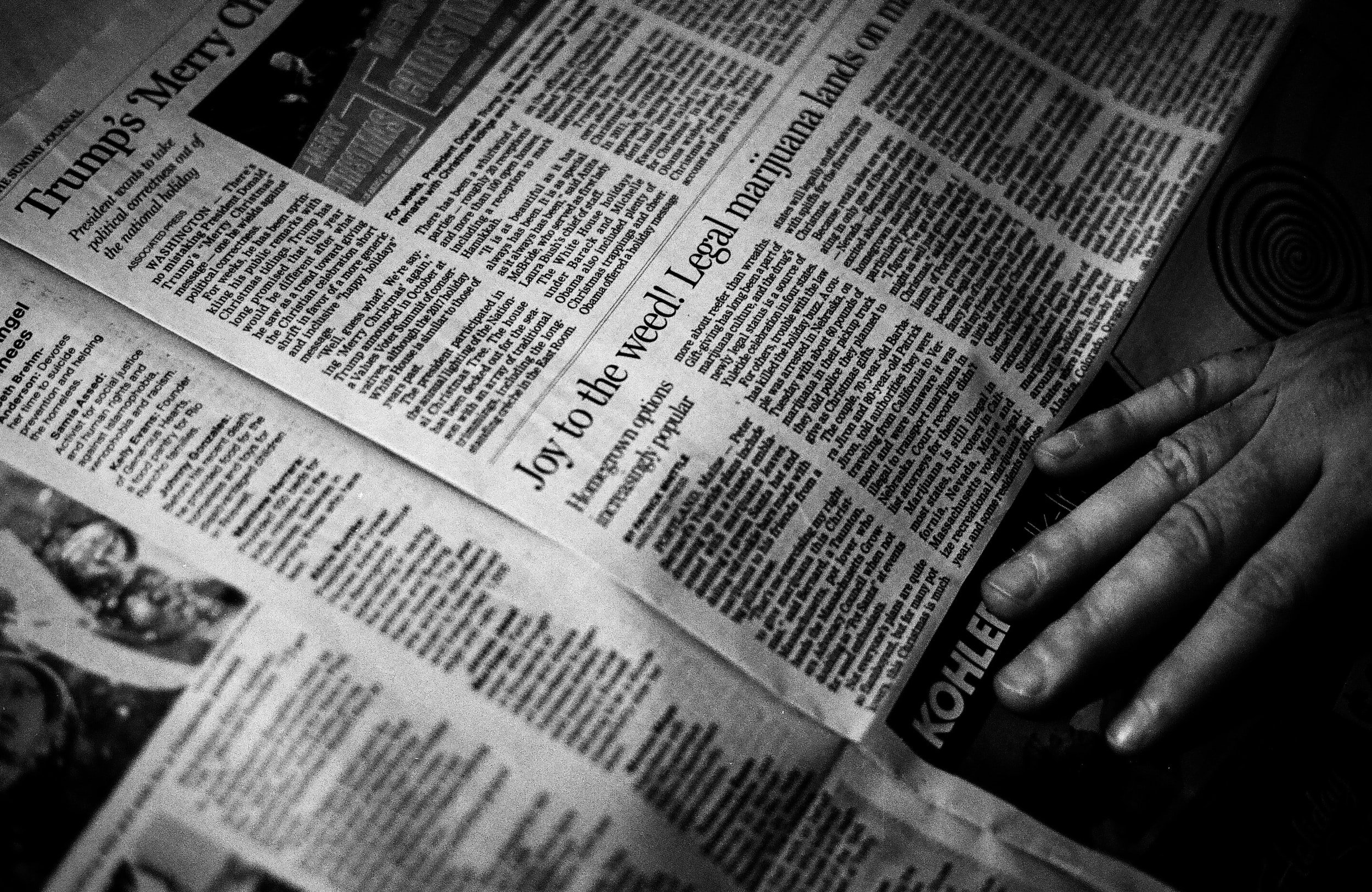
In the media
Click here for the full article.
‘What If’ Scholarship Supports Young Women Pursuing Dream Careers
Yorkville University features Juliann Rasanayagam and the inaugural winners of Empathic Counselling Centre’s “What If” Scholarship. Check out the link to read more about how Juliann was inspired by her clients and the amazing stories of our winners!
International Women’s Day Celebration 2021
In line with the theme, “Choose to Challenge”, Juliann challenges the way young South Asian women are compelled to be “good girls” while sacrificing their true identity in a world that forces you to pick one identity over another.
The Front Row Podcast
Juliann and her dear friend Joe discuss all things business, work, life, career and what it means to follow your passions and how sweet it feels to earn that first $20.
The importance of the Therapist-client relationship
Success in therapy depends on the relationship you are able to build with your therapist. Check out this video to see what I have to say about it.
How to stop Thinking about Something
OnJourney.com
"Try this – for the next 10 seconds, don’t think about a pink elephant. What’s happening? You’re thinking about a pink elephant, aren’t you?
It’s not easy to stop thinking about something because our brain is not wired to do so.
In very simplistic terms, our brain uses two mental processes when it comes to performing a task. One process is responsible for completing the task and the other is responsible for making sure we stay on track."
Full article can be found here
NOW LIVE ON AMAZON
DIY Anger Kit
Create your own Anger Management Toolkit
We've been talking about it for months and the day is almost here! Empathic Counselling Centre is just a few moments away from publishing our very first book!
Our cover is all set and we are in our final stages of editing and prototyping! Dropping to an Amazon link near you!
How does it work?
DIY Anger Kit is an activity-heavy workbook that helps our readers create a unique toolkit of anger management tools that are specific to their anger profile. Not sure what your profile looks like? No problem. The workbook helps you identify your profile, select your tools, and test out your toolkit.
An excerpt
"Driving is a great example of how a behaviour, that was once given full attention, becomes one that we can mindlessly complete. When we first learn how to drive, we usually ensure that our mirrors are set correctly, our handbrake is down and that there is sufficient gas in the tank before we hit the road. We consciously look to our rear and side mirrors every 15 seconds and stop at the stop sign for three seconds before rolling forward. With that said, think about the last time you drove in your car. Did you make a conscious effort to look at your mirrors every 15 seconds? Or did you just do it by habit? What about when approaching a stop sign? Did you count to three and roll forward? Or did you just slow down and go when it was safe? If you’re like me, you’re probably driving the car on autopilot. How amazing is it that we are able to go from Point A to Point B without a single thought dedicated to driving?...Our anger response is similar to an experienced driver. Just like driving, we’re on autopilot during an anger episode. We allow our emotion to take the wheel and steer us in a direction that we’re not even conscious about. In order to become better at managing anger, we should become aware and familiar with our anger profile, trigger and habits. Doing so prevents us from functioning on autopilot during an anger response and it allows us to catch our anger before reacting with it. With this awareness, we are able to respond to the situation. "
When Social Media Makes You Sad
ThriveWorks.com
"In the case of social media, a lot of our thoughts are derived from comparing lives. Social media activity can lead to depression because we are exposed to a filtered perspective. We only post and see good news. We never expose or see others exposing vulnerabilities and insecurities—it is these things that make us human, and yet, we don’t share this side to us."
Full article here
The Natasha Hall Show
An interesting conversation with Robyn Flynn on what to say and what not to say/do when trying to support a friend who has lost a loved one.
How To Figure Out What You Want In A Partner — And Feel Confident Asking For It
Bustle.com
"Struggling to figure out your core values? Try the reverse to guide you: what do you not want in a partner? “These are dealbreaker items that we often do not think about," psychotherapist Juliann Rasanayagam tells Bustle”.
Full article here
How To Comfort A Friend Who Lost A Parent
HuffingtonPost.ca
"Your first instinct may be to cheer your friend up. However, sometimes it’s necessary to feel the grief".
Check out the full article here
15 Behaviours that can make someone toxic to be around
Bustle.com
"While we all have stories to tell and things we want to share, it's important not to talk over someone, interrupt, or overshadow their story with one that's bigger and better."
Check out the full article here
Has it already been a year ?
Time flies when you're having fun
In reflecting on the past year, I can't believe how far Empathic has come. What started off as a vision has fruitioned into something that I can be proud about. Empathic's dream is to provide quality counselling services in the GTA and to also be active members of the community. I think that it is so important to not only work with mental illness, but to promote mental wellness - kind of like solving the problem from both ends: proactively and responsively. I encourage everyone to seek help when needed as well as to implement healthy practices in your daily lives for mental wellness.
What's next for Empathic?
More of the good stuff.
Goal Setting for 2018 Workshop
Emotional Intelligence in the Workplace
Hosted by Canadian Tamil Professionals Association, Empathic Counselling Centre had the pleasure of conducting the Emotional Intelligence in the Workplace Workshop. Participants were walked through developing self and social awareness in order to improve emotion regulation and relationships.









